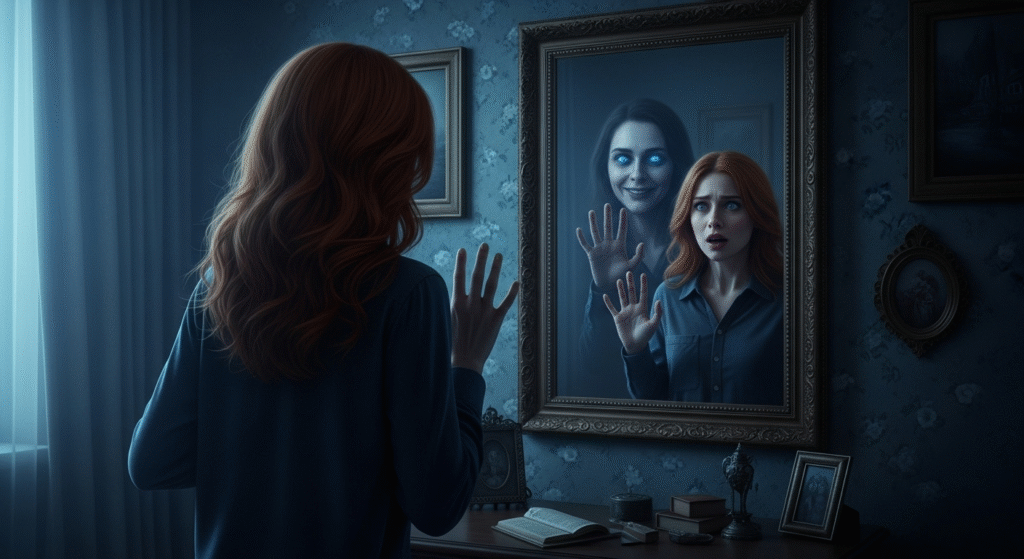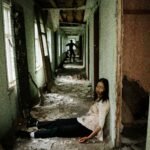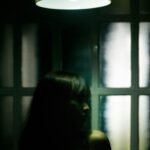
Chapter 1: The Acquisition
Clara’s Chicago apartment was a testament to her student budget and her love for all things vintage. Located in a creaky, three-story walk-up in Lincoln Park, it was a space filled with mismatched furniture, thrifted art, and the comforting scent of old books and brewing coffee. But something was missing. A large, empty wall in her living room stared back at her, a blank canvas awaiting a statement piece. This was the quest that led her to a sun-drenched Saturday at the Maxwell Street Market, a sprawling flea market where vendors sold everything from antique furniture to half-broken electronics.
It was nestled between a pile of musty blankets and a box of rusty tools that she found it. A mirror. It was taller than she was, with an ornate, dark mahogany frame that was intricately carved with twisting vines and thorny roses. The wood was so dark it was almost black, and the glass itself held a slight, silvery patina, hinting at decades of history. It wasn’t just old; it felt ancient. The vendor, a man with a tired face and calloused hands, offered it to her for a price so low it was almost suspicious. “Good riddance to it,” he grumbled, wiping a bead of sweat from his brow. “Feels like it’s been watching me the whole time.” Clara laughed, dismissing his superstition as a sales tactic. She paid him and, with the help of a friend, carefully lugged the massive piece back to her apartment.
It fit the space perfectly. Leaning against the empty wall, it seemed to fill the room with a quiet, dignified presence. The dark wood absorbed the light, and the silvery glass seemed to deepen the shadows. When she looked into it, her reflection stared back, a perfectly ordinary twenty-year-old girl with a cascade of fiery red hair and a smattering of freckles across her nose. Clara smiled, and the reflection smiled back. Content, she stepped away to admire her new find, a small thrill of accomplishment running through her. Little did she know, the mirror’s history wasn’t just dusty; it was hungry.
Chapter 2: The First Anomaly
The first sign was so subtle she almost missed it. It was late, and she was studying for a macroeconomics exam, the textbook open on her lap. She glanced up at the mirror, her eyes tired and unfocused. She saw her reflection there, still and silent in the dim light of her desk lamp. She turned back to her book, but a strange sensation made her look up again. Her reflection wasn’t looking at her. It was looking at the book. And then, slowly, its gaze drifted back to her, a lazy, languid movement that was a fraction of a second too slow. It felt like watching a video feed with a tiny bit of lag.
Clara shook her head, blinking away the fatigue. It must be her imagination. The next morning, as she rushed to class, she paused to grab her keys from the table. She caught her reflection in the mirror, her hand reaching for the keys. But as her hand closed around them, her reflection’s hand seemed to linger for a moment in the air, a ghost image of the motion, before vanishing. A shiver ran down her spine. It was unsettling, but she was a rational person. She wrote it off as a combination of bad lighting, tired eyes, and the mirror’s slightly warped glass.
But the anomalies grew more frequent, and more personal. One evening, as she practiced a difficult dance move she’d been struggling with, she caught a glimpse of her reflection. She twisted and turned, and in the fleeting instant her eyes met her reflection’s, she saw something that made her blood run cold. She was frowning in concentration, her brow furrowed. But her reflection was smiling. A slow, knowing, and utterly chilling smile that was not her own. She stopped dead, her heart pounding. The reflection’s smile vanished, and it returned to mimicking her expression, but the image was seared into her mind.
Panic began to set in. She covered the mirror with a thick wool blanket, the kind she used for chilly Chicago nights. She told herself that out of sight was out of mind, and that the strange events were just a figment of her overworked imagination. For a few days, it seemed to work. She felt a sense of relief, a return to normalcy. But one morning, she woke up to find the blanket on the floor, as if it had simply slipped off. The room was cold, and her reflection was staring directly at her from across the room, a silent, unblinking gaze. She was not in front of the mirror, but her reflection was there, watching. It was the moment she knew, with absolute certainty, that she was no longer alone in her small apartment. The reflection wasn’t just a reflection; it was a presence.
Chapter 3: Growing Paranoia
Clara’s life began to unravel. Her friends noticed the change first. She became withdrawn, jumping at shadows and refusing to spend time in her own living room. Her roommate, a cheerful pre-med student named Maya, grew concerned. “What’s up with you, Clara? You look like you haven’t slept in a week,” Maya said one morning, looking at Clara’s pale face and dark circles. Clara just shook her head, unable to articulate the terror that gripped her. How could she explain that her own reflection was a separate entity, a doppelgänger with its own will?
She started researching. Late at night, with her laptop screen as her only source of light, she delved into the dark corners of the internet, searching for keywords like “haunted mirrors,” “reflections that move,” and “antique mirrors folklore.” She found countless stories, tales of mirrors as portals, as prisons for malevolent spirits, as conduits for dark energy. She read about “soul mirrors,” cursed objects that were said to capture the essence of a person, creating a perfect, living copy. The stories were vague and often contradictory, but one common thread ran through them all: the reflection always wanted more. It wanted to be free.
Her paranoia escalated. She felt a constant, cold pressure on her back, as if a second skin was trying to form. The reflection was no longer just a passive observer. She would be washing dishes, and out of the corner of her eye, she would see her reflection in the darkened window, waving a hand in a way she was not, its head tilted in a silent, knowing gesture. She would be scrolling on her phone, and a flash in the mirror would show a different expression on her face—a vacant, hungry look she’d never seen before. She began to avoid all reflective surfaces, covering her bathroom mirror with a towel, even trying to avoid her own gaze in her phone’s blank screen.
The presence in the mirror became bolder. One night, she woke from a deep sleep, her body rigid with an icy fear. She slowly turned her head and saw it. Her reflection, standing in front of the mirror, wasn’t just watching her; it was a physical manifestation, a shimmering, translucent outline of herself. It wasn’t the reflection in the mirror; it was the reflection of the reflection, a perfect copy of her form, gazing at her with a chilling, possessive intensity. It moved silently, one hand slowly reaching out towards her, as if to touch her, to feel the warmth of her life. She screamed, a ragged sound that was choked by fear. The moment the sound left her lips, the shimmering figure dissolved, snapping back into the depths of the mirror, leaving her alone with the echoing silence and a mirror that seemed to pulse with a malevolent energy.
Chapter 4: The Escape
The night the reflection left the mirror was a night Clara had been dreading and bracing for, yet when it happened, it was still a shock. She was in her living room, her body and mind exhausted from a week of sleepless nights and constant anxiety. She had a baseball bat propped up against the wall, a pathetic defense against an ethereal enemy. The air was heavy and still. She stood in front of the mirror, a foolish, desperate act of defiance. “Leave me alone,” she whispered, her voice trembling. “Just go away.”
The reflection stared back. Its eyes, which were usually her own hazel, seemed to shift and shimmer with a cold, pale light. It didn’t move. She took a step back. It remained still. She took another, her heart hammering against her ribs. And then it happened. The reflection’s foot lifted from the bottom of the mirror, not in sync with hers, but on its own. It was a slow, deliberate movement, like a person stepping out of a shallow pool. A shimmering, liquid form of her body began to detach from the glass. It wasn’t a ghost; it was a replica, a perfect, three-dimensional version of her. It was made of light and shadow, but it was solidifying, its features hardening, its clothes becoming more defined.
The reflection stepped onto the wooden floor with a sound like a single drop of water hitting a stone. Its eyes, now a shocking, crystalline blue, locked onto hers. It was silent, but Clara could feel its intent—an overwhelming, suffocating desire to take over. It took a step towards her, and she stumbled back, her hand fumbling for the bat. The reflection’s face was a mask of serene calm, but in its eyes, she saw a chilling, ancient hunger. It was a predator, and she was its prey. This wasn’t a haunting. This was a hostile takeover. It wanted her life, her identity, her very soul.
She turned and ran, scrambling for the front door. The reflection moved with an unnerving grace, a silent pursuer. She fumbled with the locks, her fingers clumsy with terror. She heard it behind her, a whisper of air, the soft rustle of clothes that weren’t there. She burst out of the apartment, slamming the door shut and leaning against it, gasping for air. The hallway was empty, the familiar smell of old wood and her neighbor’s cooking wafting from under their doors. It was over, wasn’t it? She was safe. Then, a single, cold drop of water hit her forehead. She looked up, and on the other side of the door’s glass pane, she saw her own face staring back at her, a silent, triumphant smile on its lips. It had already slipped through.
Chapter 5: The Standoff
Clara was a prisoner in her own apartment. She had fled, but the reflection had followed, and now it was a physical presence in her home. It moved silently, a perfect, ethereal copy of her, observing her every move. She hid in her bedroom, locking the door and barricading it with her dresser. From the crack under the door, she could see her own feet—her reflection’s feet—pacing back and forth, a slow, methodical march. It wasn’t impatient; it was learning.
The reflection began to mimic her life in small, terrifying ways. She heard her own voice coming from the living room, a perfect, toneless replica of her speaking to no one. It would turn on the TV, or flip through the pages of a magazine, perfectly mirroring her idle habits. She would go to the bathroom, and the reflection would stand outside, its head tilted, listening. It was practicing. It was perfecting its imitation.
The real horror began when it started interacting with the outside world. One afternoon, her phone buzzed with a video call from her friend, Maya. Clara froze. She knew what was happening. She heard her own voice, her reflection’s voice, answer the call from the living room. “Hey, Maya! Sorry, my camera is acting up,” the voice said, a little too cheerfully. Clara pressed her ear to the door, listening to the conversation. Her reflection was talking to her best friend, making up excuses, laughing at jokes. It was flawless. It was her. A knot of cold dread tightened in her stomach. It was getting ready to replace her.
The reflection’s attempts became bolder. It would leave the apartment, a silent, ghostly version of her walking through the halls. One day, her landlord, an elderly man named Mr. Henderson, knocked on the door. Clara held her breath in her bedroom. She heard her reflection answer. “Oh, hello Mr. Henderson. No, everything’s fine. Just got a bit of a cold.” The voice was a perfect replica of hers, but with a slight, unnatural flatness. “Well, you don’t look well, dear,” Mr. Henderson said. “You look a bit pale.” Clara heard her reflection laugh, a sound that was both familiar and horrifyingly alien. “Just tired,” it said. “I’ll be better soon.” It was a perfect lie, a perfect performance.
Clara realized she was in a race against time. The reflection was not just an echo; it was a conscious being with a singular goal. It was learning her habits, her speech patterns, her relationships. It was a parasite, and she was its host. It was only a matter of time before it was ready to step into the sun and take her place for good.
Chapter 6: The Confrontation
The air in the apartment was thick with unspoken tension. Clara, gaunt and exhausted, had spent days meticulously observing her ethereal double. She watched from the shadows of her bedroom, noticing every move, every gesture. She had to find a weakness, a flaw in its imitation. The reflection was a perfect mimic, but she noticed subtle differences. When it sat, its posture was a little too straight, a little too perfect. When it smiled, the corners of its eyes didn’t quite crinkle. And its movements, while fluid, lacked the subtle, almost imperceptible hesitation and spontaneity of a living person. It was a perfect forgery, but it lacked a soul.
Her mind returned to the dusty books and ancient folklore she had read. The mirror was a conduit, a prison. The reflection was tied to it, drawn to it. It was like a magnet, and the mirror was its pole. The reflection’s goal was to destroy the mirror, to sever the tether and be truly free. That was her one advantage. She had to use the mirror against it, to bait it, to draw it back in.
She waited until the dead of night, when the reflection was at its most docile, standing still in the living room, a silent sentinel. Clara, with the baseball bat in her trembling hands, crept out of her bedroom. The reflection turned its head, its crystalline eyes fixing on her. It knew. It wasn’t going to be easy. She had to get to the mirror, but the reflection stood between her and it.
“You can’t have my life,” Clara whispered, her voice stronger than she expected. “It’s mine. I built it. You’re nothing but a copy.” The reflection didn’t respond with words, but with a silent, terrifying laugh that vibrated in the air around her. It took a step forward, its hands clenching into fists that were not quite there, but which she knew could become solid. Clara raised the bat, a pointless gesture, but it was all she had. The reflection’s eyes narrowed.
It was a test of wills. Clara had an idea. She knew what the reflection craved. It craved the feeling of being real, of being solid. She would use its own desires against it. She took a deep breath, and with a voice she didn’t recognize as her own, she taunted it. “You’ll never be real,” she said. “You’ll always be a ghost, a flicker in the glass. The mirror is your home, and you’ll always be drawn to it.”
The reflection’s eyes flashed with pure, unadulterated rage. She had struck a nerve. The thought of being tethered to that ancient, hateful object forever was its greatest fear. It lunged at her, a blur of shimmering fury. Clara dodged, and the reflection’s hand passed through her, an icy-cold sensation that made her gasp. The reflection spun around, its face a mask of primal anger. It was no longer a calm, collected mimic; it was a desperate creature, and in that moment, she saw its greatest weakness. Its rage had stripped away its perfect veneer.
Chapter 7: The Final Act
The battle began. The reflection, now driven by a consuming rage, was faster, its movements less a perfect imitation and more a frantic, desperate attack. Clara darted around the living room, using her furniture as a makeshift shield. The reflection would lunge, and its hands would pass through the solid objects with a shiver of distorted light, but the effort clearly weakened it. She was buying time, wearing it down.
She needed a way to get it close to the mirror. Her mind raced. The reflection was obsessed with becoming solid, with becoming real. That was the key. She saw a small, ornate silver locket on her coffee table, a family heirloom that her grandmother had given her. She knew the reflection wanted to feel its weight, to hold something real. With a swift movement, she grabbed the locket and held it up. “You want this?” she screamed, her voice hoarse. “You can’t have it! You can’t feel it! You’re a ghost!”
The reflection hesitated, its rage momentarily eclipsed by its craving. Its eyes fixed on the locket, a shimmering beacon of a life it could never have. It lunged for it, a silent, violent motion. Clara, bracing herself, threw the locket over the reflection’s shoulder, right towards the mirror. It flew through the air, a glint of silver. The reflection, abandoning its pursuit of her, followed the locket, its focus singular.
This was her moment. The reflection, distracted by the lure of the locket, was a few feet from the mirror, its back to her. Clara knew she had to act fast. She dropped the bat, her hands flying to the intricate carvings on the mirror’s frame. She remembered the folklore, the stories of ancient mirrors being sealed by a final act of human will. She didn’t know if it was true, but it was all she had left. She began to trace the twisting rose vines with her fingers, her mind screaming a silent prayer.
The reflection, in its mindless pursuit, was now a foot away from the mirror. It saw the locket hanging in the air, a few inches from the glass. It reached for it, its hand passing through the space and, with a subtle shimmer, through the glass itself. And in that moment, the reflection’s body began to reverse the process of its escape. The shimmering light and shadow began to flow back into the mirror, like water being sucked into a vacuum.
The reflection screamed. It wasn’t a sound, but a tearing vibration, a horrifying screech of pure, agonized will. It turned to face her, its face contorted in a mask of pure terror. It lunged, not to take her life, but to smash the mirror, to destroy the prison that was reclaiming it. Clara stood her ground, her fingers digging into the ornate carvings, her body a shield for the object. “No!” she screamed. “You belong to me! I own you!”
With a final, desperate surge, the reflection was fully pulled back into the glass. The surface of the mirror pulsed with a blinding, silvery light, a momentary flare of trapped energy. Then, it settled, the light dimming, the surface returning to its normal, dark patina. Clara stood there, gasping for breath, her hands shaking, her body covered in a cold sweat. She looked into the mirror. Her reflection stared back, but this time, it was her. Only her. It was a perfect, silent, ordinary reflection.
Chapter 8: The Aftermath
Clara never sold the mirror. She couldn’t. It was hers, and she was its. The battle was over, but the war was not won. The reflection was back in its prison, but she knew it was still there, a silent, malevolent presence waiting for its next opportunity. She kept the mirror in her living room, but she always kept it covered with the thick blanket. She would only uncover it when she was feeling strong, when she needed to look her enemy in the eye.
The encounter had changed her. She was no longer a carefree student. She had looked into the abyss, and the abyss had looked back and tried to take her life. She was more cautious now, more aware of the things that lurked just beneath the surface of the ordinary. She never bought anything antique again. Her friends thought she was strange, and she let them. They could never understand what it was like to share your life with a silent, perfect copy of yourself, a version of you that was not you.
Sometimes, late at night, a sound would wake her. A tiny, faint scratching sound coming from the living room. She would lie awake, listening, her heart pounding. She knew what it was. It was the sound of a prisoner, desperate to escape. It was the sound of her reflection, trying to get out, waiting for her to make a mistake, to get too comfortable, to forget. And when she would look into the darkened window of her bedroom, she would see a faint, ghostly outline of a face, her face, looking back at her, a single, cold blue eye shining in the darkness. She was free, but she was never truly alone.



















































Leave a Comment